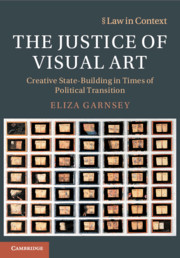Crossref Citations
This Book has been
cited by the following publications. This list is generated based on data provided by Crossref.
Lacey, Nicola
2020.
William Twining and the Law in Context series: a personal reflection.
International Journal of Law in Context,
Vol. 16,
Issue. 4,
p.
464.
Mertens, Thomas
2020.
A Philosophical Introduction to Human Rights.
Kerr, Rachel
2020.
The Palgrave Encyclopedia of Peace and Conflict Studies.
p.
1.
Bleiker, Roland
2021.
Seeing beyond disciplines: aesthetic creativity in international theory.
Australian Journal of International Affairs,
Vol. 75,
Issue. 6,
p.
573.
Cranston, Ross
2021.
Making Commercial Law through Practice 1830–1970.
Wan, Marco
2021.
Film and Constitutional Controversy.
Lähdesmäki, Tuuli
and
Čeginskas, Viktorija L. A.
2022.
Conceptualisation of heritage diplomacy in scholarship.
International Journal of Heritage Studies,
Vol. 28,
Issue. 5,
p.
635.
MacKay, Joseph
2022.
Art World Fields and Global Hegemonies.
International Studies Quarterly,
Vol. 66,
Issue. 3,
Kerr, Rachel
2022.
The Palgrave Encyclopedia of Peace and Conflict Studies.
p.
19.
Preda, Caterina
2023.
“Living Statues” and Nonuments as “Performative Monument Events” in Post-Socialist South-Eastern Europe.
Nationalities Papers,
Vol. 51,
Issue. 3,
p.
544.
Balasco, Lauren
Garnsey, Eliza
Kurze, Arnaud
and
Lamont, Christopher K.
2024.
Justicecraft: Imagining Justice in Times of Conflict.
p.
53.





